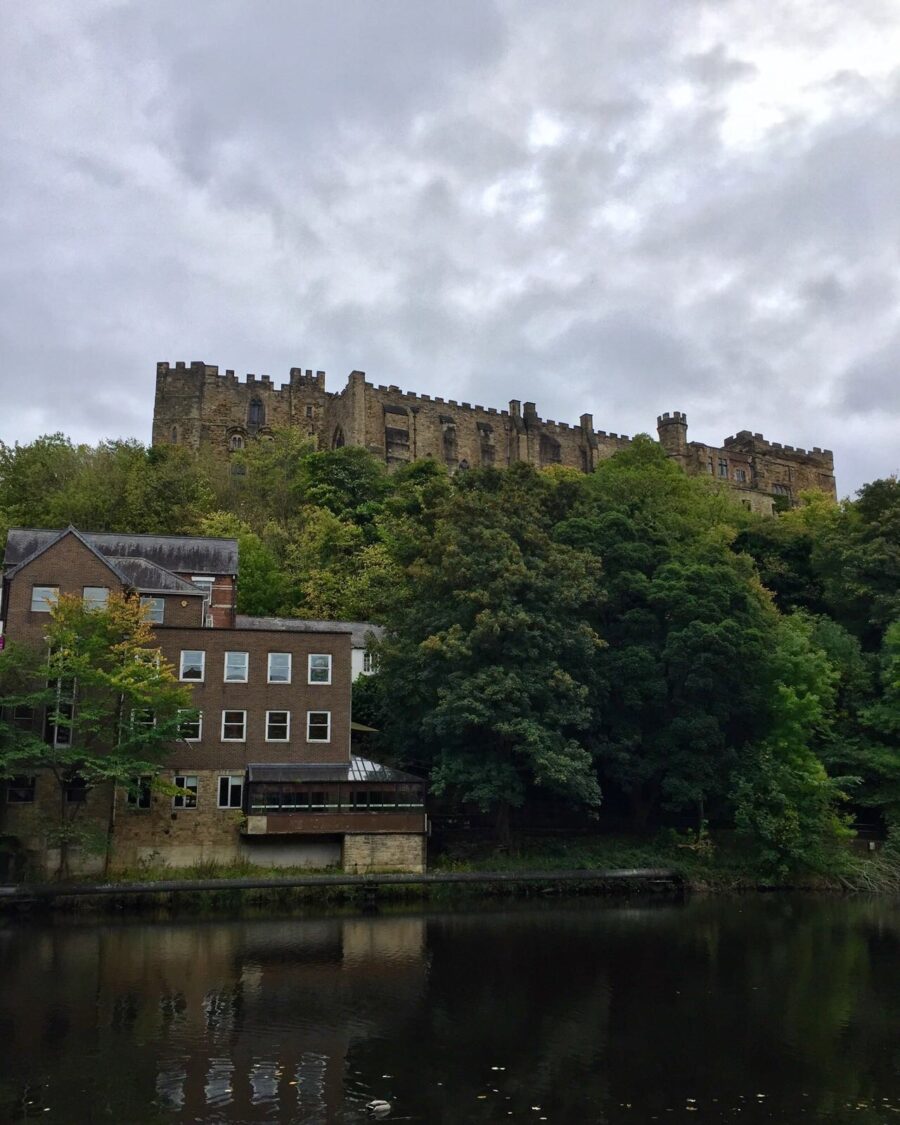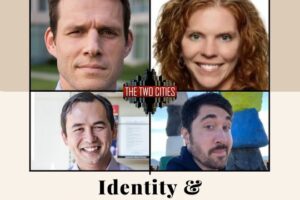My wife and I moved to the UK about a month ago and it is going brilliantly. I started a PhD program at Durham and will be here for the next few years. Although my wife and I have been out of the country before, we have never moved to another county. It is quite an experience to pack up all of your belongings, separating out the most important things that you can’t live without (which is a lot less than you think!), and trying your best to pack it up in suitcases. The miracle and magic of it all is that everything that we thought we needed fit into two large suitcases, a medium suitcase, two carry-ons, two backpacks, and one large moving box–all weighing the proper amount. Luckily, we had someone picking us up in the UK so we wouldn’t have to lug all of that around. It was very stressful but also very exciting.

We arrived in England about a week before my induction week started. Brittany and I got to roam around ancient castles and cathedrals, walk through old graveyards and along the river path, and explore a town that was totally new. It still feels like a dream as I walk through forests (or what seem like forests to a SoCal native) on my way to school. Durham has all of these little footpaths that connect various streets. Some act as shortcuts through town, cutting between buildings and people’s personal property rights, which are very helpful when you are late to class. Others act as a scenic route that takes you through the same buildings but somehow you end up walking along the river that surrounds the main part of the town. I can’t decide what is my favorite experiential scenery in Durham, but it’s between walking up the path to Palace Green that opens up to the Cathedral or if it’s the Framwellgate bridge complete with an accordion player. Maybe its just because its Hogwarts. You will just have to come see it for yourself!

However, moving across the world comes with something that I have never experienced before. It comes with an identity change – I am a foreigner. There are plenty of foreign things in America, but I have never undergone a permanent identity change. I may have been the outsider, but never the foreigner. In the UK, everything I do I do as a foreigner. When I speak, people can hear my accent. When I am looking around at all of the buildings, it’s because I am not from here; when I am looking around with my phone, it’s because I am lost. When I get on the wrong bus, or miss my stop, or don’t know how much it costs, it’s because I am a foreigner.
I don’t really know if other people are thinking that, but I know I am. The culture shift is not as jarring as moving to the middle east or Southeast Asia might be, but it’s strange how easily you can feel like a foreigner. Here are just some of the small changes:
- Pudding does not actually mean pudding. It just means dessert. Not a problem for most people, but pudding is my favorite dessert, so you can imagine the letdown.
- Chips are actually fries, and Crisps are actually Chips. Not too confusing until someone is advertising extra crispy chips.
- Everything you buy is approximately 40% smaller, six-packs don’t exist, and none of the 4 types of cereal they sell look good.
- The British cuisine found in all of the pubs is equivalent to Marie Callender’s lunch menu aka that weird food your Great Aunt always makes for Easter. It’s not bad, but certainly isn’t good. (I really miss Mexican food)
- My front door locks by lifting the handle upward instead of a deadbolt. It took me two days to figure this out.
Now, most of these are small, but there are a number of things that have been exasperating and have only happened because I am a Foreigner.
First, we had to get our phones unlocked in order to get a new sim card. However, something went wrong, and it took us almost a week to get them unlocked and set up. I actually had to buy international minutes so that we could call various companies to fix Brittany’s phone. Now, this wouldn’t be a huge deal back home. It would be an inconvenience, but we could survive on Wi-Fi. Unfortunately, we didn’t have Wi-Fi at our home, and the Wi-Fi in town is spotty. We couldn’t check google maps to figure out where we were going, nor call each other if (when) we got lost.
Second, it took us over 3 weeks to get a bank account. Actually, Brittany still doesn’t have a bank account, and I still don’t have a debit card. I had no way to prove my address to the bank so I needed my college to create for me a letter of introduction that had my name and address on it. This took 2 weeks for them to do, and when I finally went into the bank, I had to wait 4 more days for an appointment. Brittany does not have a bank account because she is not a student, so her name is not on the lease or any of my school forms. We tried to change the billing address of our credit card (the bank said they would accept this), but there is no way online or even through the call center to change our address to a UK address. Literally, a major credit card company with a branch in the UK does not have a way to change your country address! Now, this would be a frustration for most back home, but it is infuriating here. Without a bank account with a UK address (or a credit card with a UK address), we couldn’t order groceries. Now, not a big deal, but when you have already walked an ungodly amount, up and down hills, and then you come to realize that the groceries that should have come are not going to come because you don’t have a bank account because you didn’t have an official letter from the college confirming your address, the last thing you want to do is walk a few more miles, up and down hills, to get food. So, we didn’t; we ordered Dominoes. Except, we figured out that you also need a UK billing address to do that.
Third, I don’t really know if it is a foreigner problem, but everyone keeps telling me that it is. So, when you come to a new country that is a significant distance from where you were born, and your new context is filled with a large international population, you are bound to get sick. We have been here four weeks and I have been sick for 3 of them. If I was back in SoCal, this would have sucked a lot, but I could have called out sick, or just suffered through my routine. But, here, as a Foreigner, it is different. I couldn’t call out because I was starting a new program with people I had never met, and I had to make a good impression. I hadn’t figured out the public transit system, probably because I am from SoCal, so I had to walk everywhere, despite being sick. I had to figure out where a pharmacy was, and once there, I had to figure out what medicine I needed. I can’t image doing any of this in another language. Imagine, having a dreadful cough, with an earache and trying to introduce yourself in front of your class without feeling like a complete “other.”
I could go on about my experiences here in the UK, but all of them, good or bad, would be “coloured” and defined by my status as Foreigner.
The Pentateuch is a narrative about how God has chosen one man and his descendants, to be the instrument through which He will make right what is wrong, to mend what is broken, and restore what has been lost. In short, God is going to save the world through his people. Yet, the story can often be read as this distant and dusty story of this people group from a really long time ago. The story can feel a little ethnocentric at times, not racist, but highly preferential, and some may even lean into such readings by proclaiming the particularity of the people of Israel. When read in such a way, it is easy to miss the current value of such a text. Why should we pay attention to these old dusty words?
Often, many of our own experiences of God’s people can be “coloured” by exclusion. Sometimes, Church can feel like the least welcoming place. Even inclusive traditions can sometimes not translate well, and we can be made to feel like the outsider, the foreigner.
Well, buried inside this story of how God is going save the world is this collection of instructions called the Torah. These instructions were provided by God and were given to his people Israel in order to shape them into the particular type of people God wanted them to be like. God wanted them to image and reflect himself like he had originally created them to. Now, within these instructions, there is a lot of talk about holiness and purity and being distinct from the nations, but there are also a surprising amount of instructions regarding sojourners or foreigners.
- “You shall not wrong a sojourner or oppress him, for you were sojourners in the land of Egypt.” – Exodus 22:21
- “You shall not oppress a resident alien; you know the heart of an alien, for you were aliens in the land of Egypt.” – Exodus 23:9
- “When an alien resides with you in your land, you shall not oppress the alien. The alien who resides with you shall be to you as the citizen among you; you shall love the alien as yourself, for you were aliens in the land of Egypt: I am the LORD your God.” – Leviticus 19:33-34
These verses are prescriptive for Israel, and the rationale is founded upon empathy and their own history. Throughout Genesis, the patriarchs were sojourners who eventually ended up sojourning some more in Egypt. Then after being oppressed sojourners, the Israelites were rescued and then sojourned, but this time, it was in a desert. They know what it’s like to be taken advantage of in a foreign land. So, God instructs them to not oppress the foreigner and to treat them with respect. Now, this in itself is pretty countercultural. We tend to wound others in similar ways to how we have been wounded. I punch you and you will punch me back. After suffering so much as a foreigner, time after time, it would make perfect sense for Israel to adopt a posture of hostility toward outsiders, but they don’t, and God doesn’t stop there.
God does not simply give prohibitions about foreigners, i.e. don’t be mean to them, he also instructs his people to provide for their needs.
“When you reap the harvest of your land, you shall not reap your field right up to its edge, neither shall you gather the gleanings after your harvest. And you shall not strip your vineyard bare, neither shall you gather the fallen grapes of your vineyard. You shall leave them for the poor and for the sojourner: I am the Lord your God.” (Leviticus 19:9-10)
This verse is frequently echoed regarding how Israel’s economy is supposed to be run. The book of Ruth illustrates this very scenario as Boaz provides for the foreigner by allowing her to glean from his fields.
Lastly, God does not give prohibitive or providential commands, He takes it one step further: He includes people.
“Every native Israelite shall do these things in this way, in offering a food offering, with a pleasing aroma to the Lord. And if a stranger is sojourning with you, or anyone is living permanently among you, and he wishes to offer a food offering, with a pleasing aroma to the Lord, he shall do as you do. For the assembly, there shall be one statute for you and for the stranger who sojourns with you, a statute forever throughout your generations. You and the sojourner shall be alike before the Lord. One law and one rule shall be for you and for the stranger who sojourns with you.” (Numbers 15:13-16)
The context is regarding sacrifices and the appropriate way of going about them. What I find interesting is that sacrifices are the way to worship God and remain in his presence. One would expect there to be a strict code on who could participate in these rituals (and there are various personal purity laws and requirements), but this passage communicates an inclusiveness to the Israelite religion which reminds the reader of God’s covenant to Abraham, that through him, All the nations will be blessed. What is interesting to note is that the author makes use of the three common words of statute (חֻקָּ֥ה), Law (תּוֹרָ֥ה), and Rule or judgement (מִשְׁפָּ֥ט). These synonymous words used in combination with one another emphatically signifies totality; these words combined with the repetitive “one” communicates singularity. There is only ONE INSTRUCTION for the native and foreigner. Before God in proper worship, there is no difference or distinction between the native or the foreigner. They are both worshipping as the people of God.
It would seem that God may still speak through these words today. As the people of God, we are called to image our God, the one who not only cares for the foreigner but includes them into the community. I think of my own experience here in Durham, and I have been blown away by the hospitality. People have invited us over for dinner (it’s usually the first thing they say), invited us to their church, let us borrow their car, and even invited Brittany to their baby shower. At the churches we have visited, the leaders have gone out of their way to explain communion and invite everyone to take it if they feel comfortable. Even though we are foreigners, we have been made to feel like family.
For those who are reading this in America, especially for those who were born there, I would like to encourage you to begin and to keep on supporting the foreigner. Many of my experiences have been frustrating because I have thought, “this is not how it works in America!” However, I am coming to realize, that that is exactly how it works in America when you are a foreigner. It is quite a shocking experience to come face to face with my own privileges that come with being a native only when I experience a lack of privilege as a foreigner. This privilege isn’t bad, nor do I need to feel bad about it, but I should be aware of it as I interact with others who may not have the same privilege.
In order to image the God who loves the foreigner, it will take some work. It’s more than just not being a jerk to foreigners, and it’s more than just being friendly. It’s about including them and inviting them into your life. It’s about transforming your relationship from foreigner to family. It will mean talking to people who look different than you and listening to their stories. It will mean inviting them to coffee and inviting them into your homes. It will probably mean that you will have to fundamentally change your life. But we can gladly do this because God has called us to this: to preach the gospel to every tribe, tongue, and nation. Fortunately for us, God is working, and making the nations come to us, which means, we can, in a way, be a cross-cultural missionary to our neighbor across the road.





1 Comment
Leave your reply.